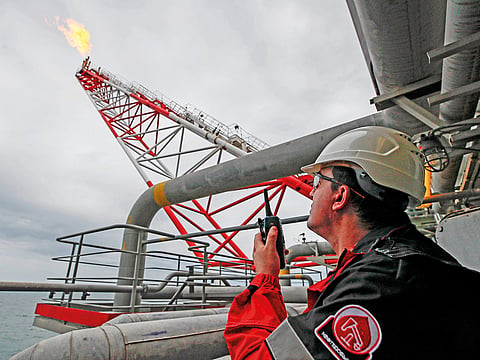No relief for oil as production cuts fail to deliver
Opec and the likes of Russia need to agree on more if prices are to turn around

Abu Dhabi: Oil is expected to slide further in the coming days due to a potent mix of oversupply and weak demand. The global benchmark, Brent, is trading at $50.47 (Dh185.62) per barrel, down more than 6 per cent, and the United States crude West Texas Intermediate at $42.53 per barrel, down about 7 per cent.
Brent has tumbled nearly 40 per cent since early October due to the supply-demand equation.
“There is a very much the possibility of oil falling below $50 per barrel, or even $40, due to over production and weak demand,” said Jaafar Al Taie, managing director of Manaar Energy Group. There has been less-than-expected pressure on Iran from the US sanctions and production continues to be strong from Opec members and in Russia.
“Much less Iranian barrels have been taken out of the market due to waivers granted by the US administration,” he added. “We had in mind maybe one million barrels of oil per day will be taken out — but the sanctions are so limited that we have a surplus now and only 500,000 barrels of oil per day are off the market.
“On the other hand, Russian production is still strong and Iraq’s production continues to be resilient despite the conflict. We also expect Saudi Arabia to keep pumping more oil as it invests in refineries across the globe.”
Demand side remains weak, especially from India as the gross domestic product growth that was expected hasn’t materialised due to policies of the current government.
Speaking on the Organisation of the Petroleum Exporting Countries (Opec) deal on output cuts, which will come into effect from January 1, Al Taie said it will have a limited impact on prices initially due to differences among Opec members on the quantity of cuts for each country.
“They (Opec and non-Opec producers like Russia) made a deal, but there are still differences among members and they still need time before they agree on a robust deal. They all look to Saudi Arabia to make the blind share of cuts ... but Saudi Arabia wants more contribution from Russia, Iraq and other countries.”
Ehsan Khoman, head of Mena Research and Strategy at MUFG Bank, also expects oil prices to continue drifting lower due to economic uncertainties. “If the economic pessimism persists into 2019, we expect oil prices to continue drifting lower as demand forecasts are revised on the downside. If some of the concerns about the health of the global economy — escalating trade tensions, the uncertainty surrounding Brexit, the Fed’s latest rate hike and the US government shutdown — start to ease, then a potential rebound in oil prices could be swift.”



